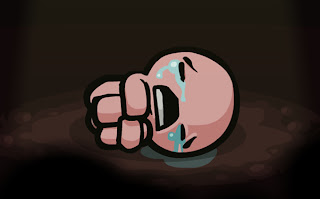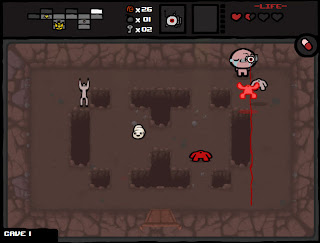I apologise in advance that this following piece is going to be a bit of light academic discussion (I hope it provokes some conversation in the comments!), but I do believe that if games are going to be taken seriously as art, then they should be treated as such, and analysed as such.
With that setting the context, I believe Nintendo is being grossly irresponsible in blocking Binding of Isaac from release through its download portal. That act of censorship due to “questionable themes” damages the very idea that games can be art, when one important expression of art is transgression.
Binding of Isaac is quite clearly an example of transgressive art: it exists in no small part because it wants to shock its players, and in doing so, encourage them to think about the game, and indeed why they are offended. And yes, for some people it will be offensive.
Theories around transgression and art can largely be attributed to Georges Bataille and Michael Foucault, and to greatly paraphrase them; if taboos aren’t broken, then the taboos can’t be affirmed by society, and progress cannot be made. Without pushing the limits of good taste society cannot determine what good taste is.
As transgressive art, Binding of Isaac is also part of a broader art movement. One that extends into cinema, literature, sculpture and painting. The difference is that the censorship of the art is far, far more extensive in the video game medium, and it’s completely inappropriate for Nintendo to be doing it.
Nintendo is one of the three major, mainstream gaming companies. Gaming, in turn, is now if not the dominant entertainment medium, close to it. Call of Duty, for instance, is now able to outsell movies and books, and did so with the last instalment, which set an all-time record for first five-day sales with $650 million globally.
As a dominant entertainment medium, the videogame industry needs to take a leadership role in furthering art, and as a dominant player within that medium, Nintendo needs to be responsible – yes in terms of making sure individuals aren’t exposed to material they don’t want to be – but also to give people the opportunity to engage with genuine artworks.
And transgressive art might be controversial, but it’s still art.
Of course, the games industry is slightly different in that there is this expectation that the big three players will moderate things, even steralise them, so that the user experience is “safe” for everyone. But, bookstores stock the work of Marquis de Sade despite the potential that it will end up in a child’s hands. Movie cinemas continue to play adult-only, shocking material. Transgressive art exhibitions happen all over the planet, constantly. Yes the retailer and parents need to take measures to protect the children, but it is not the responsibility of the company that prints the books or the DVD player manufacturers to take the power onto themselves. Likewise it should not be Nintendo’s role to prevent people from accessing art – that’s the job of the classifications board and parents.
To do otherwise is to stunt the growth of the games industry as an artistic medium.
For anyone interested in doing a bit more reading on the subject, I’ve linked a few Wikipedia articles below. Far be it for me to suggest Wikipedia as a reliable source, but it’s a good start for anyone interested in the artistic value of transgression.

.jpg)







It looked like quite a good game as well 🙁 It annoys me when Nintendo does this!
It looked like quite a good game as well 🙁 It annoys me when Nintendo does this!
The game would probably have gotten an AO rating and wouldn't have been accepted on any on the other services either. It's not just Nintendo, so your argument is faulty right away.
The game would probably have gotten an AO rating and wouldn't have been accepted on any on the other services either. It's not just Nintendo, so your argument is faulty right away.
Hi Phillip,
I think there's some misunderstanding with what I'm actaully saying here. The piece is about Nintendo because the news it's based on is about Nintendo. What I'm saying applies equally to Sony and Microsoft.
As for what I'm saying – I'm not talking about "censorship" the the sense that you are. Nintendo, as one of the major platform holders needs to understand that games are not just running around and jumping on mushroom people any more. They're a legitimate artistic medium. Art is, at times, controversial. At times even offensive.
And sometimes it needs to be censored. When it breaks through Foucault's limit and defines the limit's existance, then the censorship bodies need to step in and act. That is not Nintendo's job. Nintendo is like the art gallery, and while in real life art galleries can decide not to display controversial material, I would argue that the games industry, with just three big "art galleries" hasn't got that luxury. To forward the cause of art all three need to understand their role is not to censor content.
I'm sorry you didn't appreciate the piece, but I hope this helps clarify for you that it's also not so simple as to be a piece "attacking Nintendo for censorship." It's a far more broad issue than that.
Hi Phillip,
I think there's some misunderstanding with what I'm actaully saying here. The piece is about Nintendo because the news it's based on is about Nintendo. What I'm saying applies equally to Sony and Microsoft.
As for what I'm saying – I'm not talking about "censorship" the the sense that you are. Nintendo, as one of the major platform holders needs to understand that games are not just running around and jumping on mushroom people any more. They're a legitimate artistic medium. Art is, at times, controversial. At times even offensive.
And sometimes it needs to be censored. When it breaks through Foucault's limit and defines the limit's existance, then the censorship bodies need to step in and act. That is not Nintendo's job. Nintendo is like the art gallery, and while in real life art galleries can decide not to display controversial material, I would argue that the games industry, with just three big "art galleries" hasn't got that luxury. To forward the cause of art all three need to understand their role is not to censor content.
I'm sorry you didn't appreciate the piece, but I hope this helps clarify for you that it's also not so simple as to be a piece "attacking Nintendo for censorship." It's a far more broad issue than that.
No, no. I appreciated your article as always. Don't get me wrong. I just don't agree with it. That's all. 🙂
No, no. I appreciated your article as always. Don't get me wrong. I just don't agree with it. That's all. 🙂
It wouldn't be a discussion about art if people agreed! 😉
It wouldn't be a discussion about art if people agreed! 😉
Hi superphillip32,
The game is actually already available on Steam and I've played through it myself. As a devout Christian man myself, the opening sequence of the game could definitely be considered to be sacrilegious, but it can also be easily skipped. Outside of the intro video, it's basically a simple, yet dark and bloody version of an isometric Zelda title. It's actually a good bit of fun too.
Nintendo could have simple stripped the intro video and it would have been fine for their system. They are touting that Darksiders II is coming to the Wii U, but they won't allow this on the 3DS?
Hi superphillip32,
The game is actually already available on Steam and I've played through it myself. As a devout Christian man myself, the opening sequence of the game could definitely be considered to be sacrilegious, but it can also be easily skipped. Outside of the intro video, it's basically a simple, yet dark and bloody version of an isometric Zelda title. It's actually a good bit of fun too.
Nintendo could have simple stripped the intro video and it would have been fine for their system. They are touting that Darksiders II is coming to the Wii U, but they won't allow this on the 3DS?
I agree with your argument in the piece, but I actually don't think that Edmund McMillen is using the Binding of Isaac as transgressive art intentionally, instead he's simply using a story from the Bible and giving it a Team Meat flip of sorts.
As I stated above, the game doesn't actually have a 'shock' factor when playing it at all. It's actually almost kinda cute in a strange way and it's really funny.
Great argument as always man! 🙂
I agree with your argument in the piece, but I actually don't think that Edmund McMillen is using the Binding of Isaac as transgressive art intentionally, instead he's simply using a story from the Bible and giving it a Team Meat flip of sorts.
As I stated above, the game doesn't actually have a 'shock' factor when playing it at all. It's actually almost kinda cute in a strange way and it's really funny.
Great argument as always man! 🙂